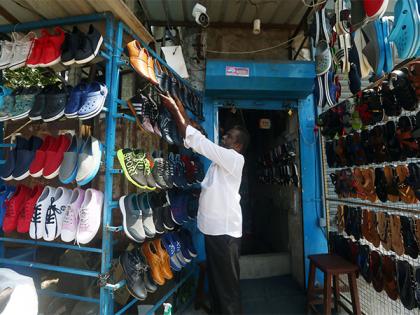India's leather, footwear exports to UK could exceed USD 900 mn as FTA opens new opportunities for small artisans
By ANI | Updated: July 24, 2025 15:09 IST2025-07-24T15:04:36+5:302025-07-24T15:09:26+5:30
New Delhi [India], July 24 : India's leather and footwear exports to the UK could exceed USD 900 million, ...

India's leather, footwear exports to UK could exceed USD 900 mn as FTA opens new opportunities for small artisans
New Delhi [India], July 24 : India's leather and footwear exports to the UK could exceed USD 900 million, marking a major leap forward for the sector.
This growth is expected as the India-UK Free Trade Agreement (FTA) opens up new opportunities for small artisans and businesses across the country.
The FTA offers duty-free access to the UK's USD 23 billion market, giving Indian Micro, Small and Medium Enterprises (MSMEs) a strong advantage over other countries like Bangladesh, Cambodia, and Pakistan in labour-intensive sectors such as leather and footwear, textiles and clothing, gems and jewellery, furniture, and sports goods.
This is expected to unlock vast new opportunities for Indian exporters.
The agreement is also likely to enhance the financial stability of small businesses, particularly for artisans, women entrepreneurs, and craftsmen.
By providing them with access to a large market like the UK, the FTA enables these groups to support their families and communities while becoming key players in global value chains.
The FTA includes provisions that encourage MSMEs to utilise digital tools, adopt e-commerce, and transition to more sustainable production methods. These changes will not only enhance efficiency but also enable Indian products to reach a broader international audience.
With stronger intellectual property rights (IPR) and geographical indication (GI) protections included in the deal, MSMEs' unique and traditional products are expected to gain better recognition globally. This can increase the value of their goods in foreign markets.
Increased export opportunities in labour-intensive industries, such as textiles, leather, and footwear, are expected to raise demand for skilled artisans in hubs like Tirupur and Kanpur. This, in turn, could create more jobs and boost local economies.
As exports rise, private sector players in India are also expected to increase their production capacity. This is likely to lead to increased employment and improved income for individuals involved in these industries.
India is now well-positioned to become one of the top three suppliers of textiles, leather, and footwear to the UK. SMEs across different states are expected to expand their production, hire more workers, and contribute to the development of their communities.
In addition to leather and textiles, MSMEs in other sectors, such as marine products, agriculture, pharmaceuticals, chemicals, electronics, engineering, oilseeds, alcoholic beverages, and soft commodities, are also expected to benefit from the FTA by increasing production and innovation.
Disclaimer: This post has been auto-published from an agency feed without any modifications to the text and has not been reviewed by an editor
Open in app